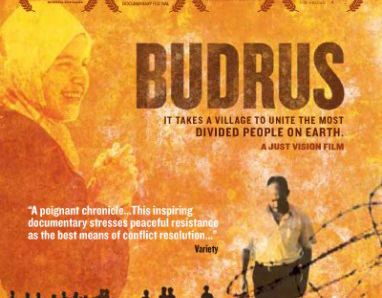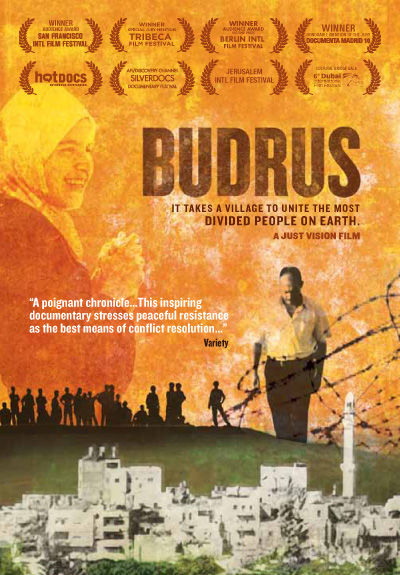Review by Spencer Gordon
Photo provided by Budrus
Budrus
Directed By Julia Bacha
Throughout 2003, Julia Bacha (Encounter Point) and her camera team were right in the middle of the gunfire and stones exchanged between Israeli and Palestinian forces in the small town of Budrus. Bacha and team traveled to Budrus to find Israeli forces destroying hundreds of acres of land to build a fence that would divide the two groups. The town, however, wasn’t going to calmly give its land away.
The reason for the wall, as Israeli army spokesperson Doron Spielman says in the film, was to prevent the deaths of citizens. But constructed in an elaborate scheme of twists and turns, the wall broke deep into Palestinian territory instead of following the border established by the two forces in 1949. Enraged by the change, the citizens of Budrus decided to take action by staging a non-violent protest against the Israeli building team of construction workers and riot police. As Bacha’s film documents, this small village of 1,500 people effectively influenced an international peace movement that not only brought in supporters from Israel, but also America, South Africa and Europe.
The first half of the film does a great job showing the efforts of the protesters. Residents of Budrus revolted every day from dawn till dusk in the desert in order to save their town. And as the intensity of the conflict heightens, so does the film. Each side increases its firepower, and the non-violent protesters turn violent while the army uses any means necessary to deter them. The camera crew is right in the line of fire so we as an audience watch as bullets fly through the air.
However, despite such action, the most intensely moving part of Budrus comes with the realization that this is no staged shoot but a real event. A real event that is just a small example of the others even more violent and more intense taking place throughout the Middle East.
Budrus gave me a perspective on this part of the world that no previous news report has. The only thing I found disagreeable was the theme of peace Bacha unsuccessfully tries to spread throughout the film. Sure, the “peaceful” protest prompted a sort of make-shift alliance with some of the Israeli population, but it turned ugly as the number of protesters grew.
I wanted to write this review about the inspirational tale of a village beating the odds and getting its land back, but in reality, I wrote this review to say that even if the Budrus protest did win back land, the struggle to get there was unbelievable. Budrus tried using democracy as a plan of action, and the government (that is supposed to be democratic but obviously isn’t) didn’t know how to respond, resulting in violence. I want to say that I have a proposed solution to such a dilemma. Bacha seems to have had one in mind by portraying the protesters of Budrus as the film’s protagonists. But at this point, there just isn’t a clear solution. And so unlike Bacha, I don’t see non-violent protests as the answer to violence but rather nothing but a delay to more conflict.
Grade: B+. As a documentary goes it is simple and to the point, but with an issue as sensitive as this one, is there any other way to put it?
Like what you read? See what other films Spencer has reviewed.









